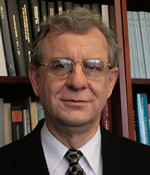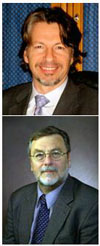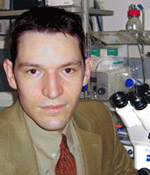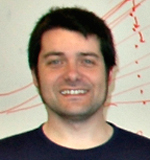What’s Happening At The McGowan Institute?
May 2012 | VOL. 11, NO. 5 | www.mcgowan.pitt.edu
Study Assesses the Utility of the Destination Therapy Risk Score in Patients with Continuous Flow LVADs
McGowan Institute for Regenerative Medicine affiliated faculty member  Jeffrey Teuteberg, MD, assistant professor of medicine, associate director of the Heart Transplant Program, member of the Heart Failure/Cardiac Transplant section, and medical director, Mechanical Circulatory Support Program, University of Pittsburgh Medical Center (UPMC), and faculty member Robert Kormos, MD, professor with tenure specializing in cardiothoracic surgery at the University of Pittsburgh, director of UPMC’s Artificial Heart and Program, and co-director of the Heart Transplant Program, and colleagues authored a recent study which looked to test the usefulness of the Destination Therapy Risk Score (DTRS) in patients with continuous flow left ventricular assist devices (LVAD). The DTRS was developed to predict the risk of 90-day in-hospital mortality with pulsatile flow LVAD as destination therapy (DT).
Jeffrey Teuteberg, MD, assistant professor of medicine, associate director of the Heart Transplant Program, member of the Heart Failure/Cardiac Transplant section, and medical director, Mechanical Circulatory Support Program, University of Pittsburgh Medical Center (UPMC), and faculty member Robert Kormos, MD, professor with tenure specializing in cardiothoracic surgery at the University of Pittsburgh, director of UPMC’s Artificial Heart and Program, and co-director of the Heart Transplant Program, and colleagues authored a recent study which looked to test the usefulness of the Destination Therapy Risk Score (DTRS) in patients with continuous flow left ventricular assist devices (LVAD). The DTRS was developed to predict the risk of 90-day in-hospital mortality with pulsatile flow LVAD as destination therapy (DT).
The study, titled “Risk Assessment for Continuous Flow Left Ventricular Assist Devices: Does the Destination Therapy Risk Score Work? An Analysis of Over 1,000 Patients,” established the DTRS in 1,124 patients with the continuous flow HeartMate II LVAD as a bridge to transplant (BTT) and destination therapy (DT) and 114 DT patients with the pulsatile flow HeartMate XVE. Patients were divided into low, medium, and high risk groups. Study authors concluded that using DTRS in a large cohort of patients with a continuous flow device demonstrates only a modest ability to predict 90-day in-hospital mortality. For patients with continuous flow devices implanted as bridge to transplant (BTT), DTRS provides poor discrimination of 2-year mortality. However, for patients implanted as DT, DTRS stratifies patient outcomes over 2 years but does not characterize a group of patients with a futile outcome.
“The DTRS doesn’t work very well for BTT patients, so I wouldn’t use it in this setting,” lead investigator Dr. Teuteberg told heartwire. “You get a little bit of risk stratification for the destination-therapy patients, and it might help you talk about the likelihood of success with the patient and help them go in a little better armed for how they might do. But I think we have to look at the DTRS with a little bit of skepticism. We’re still trying to figure out what is a better way to determine how people are going to do after their implant.”
An accompanying editorial, “Timing Isn’t Everything: Donor Heart Allocation in the Present LVAD Era,” congratulates the study authors “for providing … a cautionary tale about prematurely adopting risk predictor models into clinical decision making.”
“Even though this DTRS has been widely applied and almost universally accepted, this score was never sufficiently prospectively validated,” the editorial says. “Not only did the DTRS fail to risk-stratify recipients of a continuous flow pump, but it failed to effectively risk-stratify destination therapy recipients of a HeartMate XVE, a population similar to the derivation cohort. This is an important and timely observation for those working in the field of mechanical support, a field that depends on accurate and effective risk predictor models to advise patients and inform clinical decision making.”
SCIENTIFIC ADVANCES
‘Kidney Attack’ As Serious as Heart Attack, Warns UPMC Critical Care Expert
 Kidney complications during hospitalization are as frequent and as dangerous to patients as heart attacks, and the medical community must implement recently developed guidelines to better detect and respond to the problem, said a critical care expert at UPMC and the University of Pittsburgh School of Medicine in the online version of the Journal of the American Medical Association.
Kidney complications during hospitalization are as frequent and as dangerous to patients as heart attacks, and the medical community must implement recently developed guidelines to better detect and respond to the problem, said a critical care expert at UPMC and the University of Pittsburgh School of Medicine in the online version of the Journal of the American Medical Association.
Acute kidney injury (AKI) is not well understood by doctors, and is even more unfamiliar to the public, wrote McGowan Institute for Regenerative Medicine affiliated faculty member John A. Kellum, MD, professor and vice chair for research, Department of Critical Care Medicine, Pitt School of Medicine; Rinaldo Bellomo, MD, of Austin Hospital and Melbourne University, Australia; and Claudio Ronco, MD, Ospedale San Bortolo, Vicenza, ltaly.
“Research shows that as many as 60 percent of patients in the intensive care unit will develop kidney problems, which can lead to long-term, life-threatening complications,” Dr. Kellum said. “Doctors, patients, and families should perhaps view the dangers of and the need to avoid a ‘kidney attack’ with the same sense of urgency that heart attack provokes.”
Until recently, there were no recommendations about when to start treatments, such as a medication change, correcting fluid overload, or dialysis, in response to abnormal kidney function, he said. But in March, an international panel of experts co-chaired by Dr. Kellum established clinical practice guidelines to end the confusion.
At UPMC, an effort will launch this month in which an alert will appear in the electronic medical record when certain lab tests of kidney function are abnormal. It will cue the medical staff to seek advice about appropriate therapeutic strategies from nephrologists or, in the case of severe illness, critical care specialists.
“That’s a simple way of making sure that the patient gets assessed early by clinicians who have the most experience in managing AKI,” Dr. Kellum said. “UPMC already includes a sign of kidney attack—very low urine output—as a trigger for its rapid-response team. The idea is to address kidney attacks just as we do with cardiac arrest and other scenarios in which a “patient becomes dangerously ill very quickly.”
And, as detection and public awareness of AKI improves, there could be more support for research into the problem, said the authors, who noted also that estimates indicate that in 2012, 3 million people worldwide could die of AKI, which currently has no definitive treatment.
Renal Cell Carcinoma Focus of Clinical Trial
 McGowan Institute for Regenerative Medicine affiliated faculty member Michael Lotze, PhD, professor of surgery and bioengineering, vice chair of research within the Department of Surgery, assistant vice chancellor in the six schools of the health sciences at Pitt, and director of strategic partnerships within the University of Pittsburgh Cancer Institute as well as the Catalyst Program within the recently funded Clinical and Translational Research Institute, is the principal investigator of an ongoing clinical trial focused on renal cell carcinoma (RCC). The main goal of the research study is to determine whether treating renal cell cancer patients with the study drug, hydroxychloroquine, along with IL-2, a standard treatment of kidney cancer that has spread to other parts of the body, can make the cancer easier to kill and eliminate. Another goal is to see how the study drug affects the body’s immune cells which fight cancer cells.
McGowan Institute for Regenerative Medicine affiliated faculty member Michael Lotze, PhD, professor of surgery and bioengineering, vice chair of research within the Department of Surgery, assistant vice chancellor in the six schools of the health sciences at Pitt, and director of strategic partnerships within the University of Pittsburgh Cancer Institute as well as the Catalyst Program within the recently funded Clinical and Translational Research Institute, is the principal investigator of an ongoing clinical trial focused on renal cell carcinoma (RCC). The main goal of the research study is to determine whether treating renal cell cancer patients with the study drug, hydroxychloroquine, along with IL-2, a standard treatment of kidney cancer that has spread to other parts of the body, can make the cancer easier to kill and eliminate. Another goal is to see how the study drug affects the body’s immune cells which fight cancer cells.
The rationale for combining the high dose bolus aldesleukin with hydroxychloroquine includes potential positive interactions on the immune regulatory side, non-overlapping toxicities, and potential for prolongation and increased number of responses based on pre-clinical studies conducted at the University of Pittsburgh. Dr. Lotze and McGowan Institute for Regenerative Medicine faculty member Donna Stolze, PhD, associate director of the Center for Biologic Imaging and associate professor in the Department of Cell Biology and Physiology at the University of Pittsburgh, are among the authors of the pre-clinical study’s results recently published in the journal, Cancer Research.
The ongoing clinical study is a multi-center phase II study designed to estimate the efficacy of combination therapy of standard high dose bolus IL-2 and various doses of hydroxychloroquine therapy in metastatic RCC patients.
“What’s new is our understanding of autophagy,” Dr. Lotze said. “Our innovation was to marry tumor immunology to autophagy.”
Genome Variation in Prostate Tumors and Blood Samples Could Help Predict Disease Progression, Says Pitt Team
 The detection of certain gene abnormalities in the blood or tumor tissue of prostate cancer patients can predict the likelihood of relapse, according to McGowan Institute for Regenerative Medicine affiliated faculty member George Michalopolous, MD, PhD, professor and chairman of the Department of Pathology at the University of Pittsburgh School of Medicine, and researchers at the School of Medicine. The team’s findings show that the test also can indicate how aggressive or mild the relapse will be.
The detection of certain gene abnormalities in the blood or tumor tissue of prostate cancer patients can predict the likelihood of relapse, according to McGowan Institute for Regenerative Medicine affiliated faculty member George Michalopolous, MD, PhD, professor and chairman of the Department of Pathology at the University of Pittsburgh School of Medicine, and researchers at the School of Medicine. The team’s findings show that the test also can indicate how aggressive or mild the relapse will be.
Currently, prostate-specific antigen, or PSA, blood levels are tested to monitor the status of prostate tumors, said senior investigator Jian-Hua Luo, MD, PhD, associate professor, Department of Pathology, University of Pittsburgh School of Medicine. But measuring copy number variation (CNV), which is the deletion or increased redundancy of areas of DNA within chromosomes, in the tumor, neighboring tissues, or blood better reflects the state of the cancer.
“Our method will allow us to determine at the time of, or after biopsy or prostate removal, whether the cancer is likely to come back and, if so, how aggressively,” he said. “It promises to more accurately predict the progression of the disease.”
For the study, the researchers analyzed the genomes of 238 samples obtained from men whose prostate glands were surgically removed; 104 prostate tumor samples, 85 blood samples from prostate cancer patients, and 49 samples of disease-free prostate tissues neighboring the tumors.
A third of the samples were from patients whose cancer had recurred and whose PSA level had doubled in less than 4 months, which is associated with lethal prostate cancer; a third from patients with disease recurrence with a slowly increasing PSA level that doubled in more than 15 months; and a third with no relapse more than 5 years after surgery. The researchers also examined an additional 25 samples from prostate cancer patients to validate their findings.
They found that deletion and increased redundancy of DNA occurred in all chromosomes in prostate cancer samples. Some of these changes occurred with high frequency. Deletion and increased redundancy of DNA also occurred in benign neighboring tissue and blood samples of the cancer patients.
Gene-specific tumor CNV could correctly predict 73 percent of cases that had relapsed and 75 percent of cases in which PSA levels rapidly doubled. The CNV model from disease-free neighboring tissue correctly predicted 67 percent of cases for relapse and 77 percent of cases for short PSA doubling time. A specific tumor CNV from blood could correctly predict 81 percent of relapse cases and 69 percent of the cases for short PSA doubling time. The consistency of the associations across specimen types suggest that CNV analysis could reliably indicate what the likelihood of recurrence is either at the time of biopsy of a suspicious mass, when the tumor is removed, and in post-treatment blood monitoring, and could help doctors decide early in the disease process whether an individual’s cancer warrants additional therapy, Dr. Luo said.
Patients Are Their Primary Focus
 Pittsburgh Magazine recently published astonishing stories of patients who cheated death or permanent disability, and the physicians who saved their lives. Featured in these patient stories were the medical efforts of two McGowan Institute for Regenerative Medicine affiliated faculty members (pictured left to right):
Pittsburgh Magazine recently published astonishing stories of patients who cheated death or permanent disability, and the physicians who saved their lives. Featured in these patient stories were the medical efforts of two McGowan Institute for Regenerative Medicine affiliated faculty members (pictured left to right):
- Peter Wearden, MD, PhD, director, Pediatric Mechanical Cardiopulmonary Support Program, Children’s Hospital of Pittsburgh of UPMC, and assistant professor of cardiothoracic surgery, University of Pittsburgh School of Medicine
- David Okonkwo, MD, PhD, assistant professor, Department of Neurological Surgery, University of Pittsburgh Medical Center, director of Neurotrauma and of the Spinal Deformity Program, clinical director of the Brain Trauma Research Center, and associate director of the Center for Injury Research and Control
These two clinician-researchers were also named 2012 Top Docs by Castle Connelly Medical Ltd.
Dr. Wearden is a congenital cardiothoracic surgeon at Children’s Hospital. He currently is spearheading two National Institutes of Health-funded projects to develop an internal and external ventricular assist device (VAD) for young children. VADs are mechanical devices that take over the pumping action of the heart and offer lifesaving support, most often acting as a bridge to keep patients alive until a donor heart becomes available for transplantation. It is estimated that as many as 1,000 children annually may benefit from these technologies.
The Brain and Spine Injury Program consists of a number of programs developed to better understand and treat the problems associated with traumatic injury to the central nervous system, brain, and spinal cord, in both adults and children. Dr. Okonkwo and collaborators work with investigators worldwide through the international Spine Trauma Study Group to advance the evaluation, treatment, and outcomes of patients suffering traumatic injuries of the spinal column and spinal cord. The Neurotrauma Clinical Trials Office provides the infrastructure necessary to carry out the large number of active research protocols ongoing within the program.
Regenerative Medicine Spin-Out Funds Research Fellowship
 The McGowan Institute for Regenerative Medicine received a monetary gift award of $70,000 from ALung Technologies Inc. in support of a research fellowship in the area of respiratory assist devices. The award augments ongoing studies with the McGowan Institute for Regenerative Medicine-Medical Devices Laboratory headed by William Federspiel, PhD, the William Kepler Whiteford professor of bioengineering, chemical engineering, and surgery, University of Pittsburgh. This is the second donation from ALung in support of McGowan research and is a good example of how university spin-out companies can provide support to continue the advancement of emerging technologies.
The McGowan Institute for Regenerative Medicine received a monetary gift award of $70,000 from ALung Technologies Inc. in support of a research fellowship in the area of respiratory assist devices. The award augments ongoing studies with the McGowan Institute for Regenerative Medicine-Medical Devices Laboratory headed by William Federspiel, PhD, the William Kepler Whiteford professor of bioengineering, chemical engineering, and surgery, University of Pittsburgh. This is the second donation from ALung in support of McGowan research and is a good example of how university spin-out companies can provide support to continue the advancement of emerging technologies.
From technology originated at the McGowan Institute for Regenerative Medicine, ALung is licensed by the University and is developing a device—the Hemolung Respiratory Assist System—designed to replace or supplement ventilators in hospitals. The Hemolung Respiratory Assist System removes carbon dioxide and delivers oxygen directly to the patient’s blood via a small catheter, inserted into the jugular or femoral vein, similar to acute kidney dialysis. This treatment provides a significant benefit over intubation and mechanical ventilation, in that it will allow the patient to talk and eat, and avoid sedation, while giving the lungs the opportunity to heal.
By directly delivering oxygen to the blood and removing carbon dioxide from the blood, the HemoLung provides a superior clinical and cost-effective solution when compared to a conventional ventilator (respirator) used in an ICU. The HemoLung is designed to support patients with acute breathing problems, providing their lungs a bridge to recovery much more efficiently and safely than is currently done. There are currently 450,000 patients in the U.S. that are ventilated each year for temporary, acute respiratory failure, resulting in a potential annual market of $2.7 billion. ALung also expects that the HemoLung will be a supplement to accelerate healing for patients with Acute Respiratory Distress Syndrome (ARDS; injured lungs). On market introduction, the HemoLung is expected to replace 40-50% of ventilator use, and as physicians get comfortable with it, eventually as much as 60-80% of ventilator use in the ICU.
ALung has grown from a several person enterprise to a viable commercial enterprise. As ALung begins commercializing its system in 2012 in Europe and by 2013 in the U.S., ALung has added positions in operations, manufacturing, clinical affairs, and finance, bringing its employee count to over 25. The company has expanded its infrastructure and production capability and has moved into its own building. The “burn rate” on cash is significant for an enterprise such as Alung, especially during ramp-up to production. In October 2010, ALung announced that the company had closed a $14 million Series A financing round. The investment will support ongoing clinical trials of the HemoLung Respiratory Assist System and its subsequent commercialization.
AWARDS AND RECOGNITIONS
Dr. Peter Strick Elected to National Academy of Sciences
 In recognition of their scientific contributions and accomplishments, McGowan Institute of Regenerative Medicine affiliated faculty member Peter Strick, PhD, and two other University of Pittsburgh faculty members have been elected to membership in the prestigious U.S. National Academy of Sciences (NAS), which was established by President Abraham Lincoln in 1863 to provide independent advice to the government on matters related to science and technology.
In recognition of their scientific contributions and accomplishments, McGowan Institute of Regenerative Medicine affiliated faculty member Peter Strick, PhD, and two other University of Pittsburgh faculty members have been elected to membership in the prestigious U.S. National Academy of Sciences (NAS), which was established by President Abraham Lincoln in 1863 to provide independent advice to the government on matters related to science and technology.
- Dr. Strick, Distinguished Professor, Department of Neurobiology, whose focus is on understanding the neural circuitry that controls voluntary movement; and
- Pitt’s School of Medicine’s Yuan Chang, MD, Distinguished Professor and American Cancer Society Professor, Department of Pathology, and Patrick S. Moore, MD, MPH, Distinguished Professor and American Cancer Society Professor, Department of Microbiology and Molecular Genetics, who together identified two of the seven known human cancer-causing viruses,
are among the 84 new members and 21 foreign associates from 15 countries who were recognized this year for “their distinguished and continuing achievements in original research,” according to NAS. “Election to the Academy is considered one of the highest honors that can be accorded a U.S. scientist or engineer.”
“To have a single faculty member elected to the National Academy of Sciences would be a cause for celebration, but to have three colleagues elected in a single year is a remarkable achievement,” said University Chancellor Mark A. Nordenberg. “More than anything, this is a well-deserved tribute to the pioneering work being done by Professors Chang, Moore, and Strick. It also is reflective of a culture that supports research of impact at Pitt and is a credit to the recruiting skills of Senior Vice Chancellor Dr. Arthur S. Levine, who has brought all five of the National Academy members in our School of Medicine to Pittsburgh.”
“Drs. Chang, Moore, and Strick are outstanding researchers who have greatly added to our understanding of challenging biological questions,” said Dr. Levine, who also is the dean of the School of Medicine. “Their election to the Academy is indicative of the quality of their research and the importance of their findings.”
Dr. Strick is director of the Systems Neuroscience Institute, co-director of the Center for the Neural Basis of Cognition, a joint program between Pitt and Carnegie Mellon University, and a senior VA research career scientist at the VA Pittsburgh Healthcare System. Dr. Strick’s research investigates the neural circuits that are responsible for the control of voluntary movement, cognition, and affect. He developed the use of viruses with an affinity for neurons as a new technique for unraveling connections in the central nervous system. He received his doctorate in anatomy from the University of Pennsylvania.
Drs. Chang and Moore are co-leaders of the Cancer Virology Program at the University of Pittsburgh Cancer Institute. In 1994, they discovered the virus known as Kaposi’s sarcoma-associated herpes virus, or herpes virus 8, that causes Kaposi’s sarcoma, the most common AIDS-related malignancy. In 2008, they identified Merkel cell polyomavirus, which causes a rare and deadly skin cancer called Merkel cell carcinoma. Both received their medical degrees from the University of Utah College of Medicine.
McGowan Institute Faculty Continue to Receive Society for Biomaterials Honor
 The Society for Biomaterials is a professional society which promotes advances in biomedical materials research and development by encouragement of cooperative educational programs, clinical applications, and professional standards in the biomaterials field. Biomaterials scientists and engineers study cells, their components, complex tissues and organs, and their interactions with natural and synthetic materials and implanted prosthetic devices, as well as develop and characterize the materials used to measure, restore, and improve physiologic function, and enhance survival and quality of life. Since 2005, the Society for Biomaterials has named three faculty from the McGowan Institute for Regenerative Medicine as recipients of their most prestigious awards. Honorees (pictured left to right) include:
The Society for Biomaterials is a professional society which promotes advances in biomedical materials research and development by encouragement of cooperative educational programs, clinical applications, and professional standards in the biomaterials field. Biomaterials scientists and engineers study cells, their components, complex tissues and organs, and their interactions with natural and synthetic materials and implanted prosthetic devices, as well as develop and characterize the materials used to measure, restore, and improve physiologic function, and enhance survival and quality of life. Since 2005, the Society for Biomaterials has named three faculty from the McGowan Institute for Regenerative Medicine as recipients of their most prestigious awards. Honorees (pictured left to right) include:
Stephen F. Badylak, DVM, PhD, MD, deputy director of the McGowan Institute for Regenerative Medicine and professor, Department of Surgery, University of Pittsburgh
Steven R. Little, PhD, chair of the Department of Chemical and Petroleum Engineering, associate professor, and Bicentennial Alumni Faculty Fellow of the University of Pittsburgh Swanson School Of Engineering,
William R. Wagner, PhD, director of the McGowan Institute for Regenerative Medicine and professor of surgery, bioengineering and chemical engineering at the University of Pittsburgh
Clemson Award for Applied Research
Drs. Badylak (2005) and Wagner (2011) each received the Clemson Award for Applied Research. The award recognizes the significant utilization and application of basic knowledge in science to accomplish a significant goal in the biomaterials area. The achievement is evidenced by the development of a useful device or material which has achieved widespread usage or acceptance, or expanded knowledge of biomaterials/host tissue relationships which have received widespread acceptance and resulted in improvements in the clinical management of disease.
McGowan Institute for Regenerative Medicine Director Dr. William Wagner received the 2011 Clemson Award for Applied Research; see the McGowan Institute for Regenerative Medicine In the News (2011) for additional details of Dr. Wagner’s recognition.
Young Investigator Award
Dr. Little received the Young Investigator Award in 2012. The Young Investigator Award recognizes an individual who has demonstrated outstanding achievements in the field of biomaterials research. Recipients for the Society for Biomaterials Young Investigator Award must be within 10 years of receipt of their terminal degree (PhD or equivalent) and, if they work in an academic institution, are not tenured at the time of nomination.
For additional details on Dr. Little’s recognition, see the McGowan Institute for Regenerative Medicine In the News (2012).
McGowan Institute for Regenerative Medicine Affiliated Faculty Received Society of Critical Care Medicine’s Highest Honor
 McGowan Institute for Regenerative Medicine affiliated faculty members Derek C. Angus, MD, MPH, professor and Mitchell P. Fink Endowed Chair, and Michael R. Pinsky, MD, professor and vice chair for academic affairs, are among 20 world-renowned intensivists who are the first to be selected to receive the Society of Critical Care Medicine’s highest honorific, Master Critical Care Medicine (MCCM) Fellow. Honors were bestowed at its annual congress in Houston, Texas.
McGowan Institute for Regenerative Medicine affiliated faculty members Derek C. Angus, MD, MPH, professor and Mitchell P. Fink Endowed Chair, and Michael R. Pinsky, MD, professor and vice chair for academic affairs, are among 20 world-renowned intensivists who are the first to be selected to receive the Society of Critical Care Medicine’s highest honorific, Master Critical Care Medicine (MCCM) Fellow. Honors were bestowed at its annual congress in Houston, Texas.
Other University of Pittsburgh current critical care faculty who will receive the MCCM Fellow title are Patrick M. Kochanek, MD, professor and vice chairman, and director, Safar Center for Resuscitation Research, and Ann Thompson, M.D., professor and vice chair for faculty development, and associate dean, faculty affairs, School of Medicine. Founding chair of the critical care medicine department Mitchell Fink, MD, and emeritus professor Ake Grenvik, MD, PhD, also will be honored. Dr. Safar, who established Pitt’s Department of Anesthesiology in 1971, died in 2003.
Pitt established the nation’s first Department of Critical Care Medicine in 2002, building on a long history of achievement in the field, noted Arthur S. Levine, MD, senior vice chancellor for the health sciences and dean, School of Medicine.
“The legacy of Peter Safar, who is being awarded this prestigious honorific posthumously, lives on in the exceptional physician-researchers who make up this inaugural class of inductees,” Dr. Levine said. “Their contributions to medicine have saved countless lives, and they and those they mentor continue to break new ground in understanding and treating the most life-threatening conditions, including sepsis, brain injury and organ dysfunction, as well as gaining insight into the long-term outcomes of critical illness.”
According to the Society for Critical Care Medicine, the MCCM Fellow designation recognizes members who have been Fellows of Critical Care Medicine for at least 5 years and have achieved national and international professional prominence due to personal character, leadership, eminence in clinical practice, outstanding contributions to research and education in critical care medicine, or years of exemplary service to the Society of Critical Care Medicine, the American College of Critical Care Medicine, and the field of critical care.
Dr. Steven Little Receives 2012 Camille Dreyfus Teacher-Scholar Award
 McGowan Institute for Regenerative Medicine faculty member Steve Little, PhD, chair of the Department of Chemical and Petroleum Engineering, associate professor, and Bicentennial Alumni Faculty Fellow of the University of Pittsburgh Swanson School of Engineering, received the 2012 Camille Dreyfus Teacher-Scholar Award from the Camille & Henry Dreyfus Foundation. This highly competitive award supports the research and teaching careers of talented young faculty in the chemical sciences who demonstrate leadership in research and education.
McGowan Institute for Regenerative Medicine faculty member Steve Little, PhD, chair of the Department of Chemical and Petroleum Engineering, associate professor, and Bicentennial Alumni Faculty Fellow of the University of Pittsburgh Swanson School of Engineering, received the 2012 Camille Dreyfus Teacher-Scholar Award from the Camille & Henry Dreyfus Foundation. This highly competitive award supports the research and teaching careers of talented young faculty in the chemical sciences who demonstrate leadership in research and education.
Dr. Little’s award provides an unrestricted $75,000 research grant which will support both teaching and student research at the Swanson School. Most exciting, Dr. Little is one of possibly only two faculty members at the University of Pittsburgh to receive this award since its founding, according to Pitt’s records. He is the first in the Swanson School to be so recognized.
Because of its prestige, the Camille Dreyfus Teacher-Scholar Award is very competitive and recognizes the top chemistry researchers in their respective fields. (Universities may only submit one nominee per year.) The McGowan Institute, the Swanson School, and the entire University share in the pride of Dr. Little’s latest accomplishment.
Gerlach Lab Postdoc Presents Award-Winning Poster
 The poster presented by McGowan Institute for Regenerative Medicine postdoctoral fellow Roger Esteban, PhD, entitled Delivery of Epidermal and Dermal Stem Cells to a Burn Wound via a Spray Device- Exploring Human Fetal Skin Progenitor Cells for Regenerative Medicine Cell Based Therapy, has been selected as one of the Best Poster Presentations at the University of Pittsburgh Postdoctoral Association (UPPDA) 2012 Postdoctoral Data & Dine Symposium. Dr. Esteban works in the laboratory of McGowan Institute for Regenerative Medicine faculty member Jörg Gerlach, MD, PhD, professor in the Department of Surgery, University of Pittsburgh School of Medicine, and director of the Bioreactor Group of the McGowan Institute.
The poster presented by McGowan Institute for Regenerative Medicine postdoctoral fellow Roger Esteban, PhD, entitled Delivery of Epidermal and Dermal Stem Cells to a Burn Wound via a Spray Device- Exploring Human Fetal Skin Progenitor Cells for Regenerative Medicine Cell Based Therapy, has been selected as one of the Best Poster Presentations at the University of Pittsburgh Postdoctoral Association (UPPDA) 2012 Postdoctoral Data & Dine Symposium. Dr. Esteban works in the laboratory of McGowan Institute for Regenerative Medicine faculty member Jörg Gerlach, MD, PhD, professor in the Department of Surgery, University of Pittsburgh School of Medicine, and director of the Bioreactor Group of the McGowan Institute.
In recognition of this achievement, Dr. Esteban will receive from the UPPDA a $500 travel award to attend a scientific meeting or professional development conference. These funds may be used to pre-pay or reimburse any expenses associated with participation in a scientific meeting or professional development conference.
The travel awards recognizing Best Poster Presentations at the 2012 Postdoctoral Data & Dine Symposium were made possible through the generous contributions of sponsors across the University. It is a significant accomplishment for postdoctoral fellows whose efforts were deemed to be exemplary relative to their peers to be recognized at this event.
 Regenerative Medicine Podcast Update
Regenerative Medicine Podcast Update
The Regenerative Medicine Podcasts remain a popular web destination. Informative and entertaining, these are the most recent interviews:
#109 –– Dr. Anand Swaroop is Senior Investigator and Chief at the Neurobiology Neurodegeneration & Repair Laboratory, National Eye Institute, National Institutes of Health. Dr. Swaroop discusses his research in retinal and macular diseases and the progress his lab has made in the field.
Visit www.regenerativemedicinetoday.com to keep abreast of the new interviews.
Publication of the Month
| Authors: | Rami A. Namas, Maxim Mikheev, Jinling Yin, Patrick Over, Matthew Young, Gregory M. Constantine, Ruben Zamora, Jörg Gerlach, and Yoram Vodovotz. |
| Title: | A Biohybrid Device for the Systemic Control of Acute Inflammation |
| Summary: | Properly regulated inflammation facilitates recognition and reaction to injury or infection, but inadequate or overly robust inflammation can lead to disease. Sepsis is an inflammatory disease that accounts for nearly 10% of total U.S. deaths, costing more than $17 billion. Acute inflammation in sepsis may evolve too rapidly to be modulated appropriately, and we suggest that therapies should focus not on abolishing inflammation, but rather on attenuating the positive feedback cycle of inflammation→damage→inflammation. In Gram-negative sepsis, bacterial endotoxin causes inflammation and is driven and regulated by the cytokine tumor necrosis factor-α (TNF-α), which is, in turn, negatively regulated via its endogenous inhibitor, soluble TNF-α receptor (sTNFR). We generated stably gene-modified variants of human HepG2 hepatocytes, using lentiviral constructs coding for mouse sTNFR driven by the constitutive cytomegalovirus promoter, and seeded them in a scaled-down, experimental liver bioreactor. When connected to anesthetized, cannulated rats subjected to endotoxin infusion and maintained solely by the animals’ circulation, this biohybrid device elevated circulating sTNFR, reduced the levels of TNF-α and other key inflammatory mediators, alleviated hypotension, and reduced circulating markers of organ damage. This novel class of biohybrid devices may be modified for patient- and disease-specific application, and, thus, may represent a disruptive strategy that offers the potential for rational inflammation reprogramming. |
| Source: | Disruptive Science and Technology. 2012, 1(1): 20-27. |
Grant of the Month
| PI | Peter Wearden and Nikolai M. Krivitski | |
| Co-PI | Tim Maul | |
| Title | Bedside Monitor to Quantify Cardiac Shunt Flow in Newborns and Small Children | |
| Description |
|
|
| Source | Transonic Systems | |
| Term | 09/01/11 – 07/31/13 | |
| Amount: | $60,000 total in Year 1 and $50,000 total in Year 2 |
Newsletter Comments or Questions: McGowan@pitt.edu
